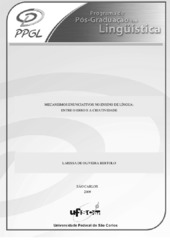Mecanismos enunciativos no ensino de língua : entre o erro e a criatividade
Abstract
This work falls within the scope of the enunciative-linguistic research. We want to build a relationship between linguistic analysis and practice of teaching and learning of mother language, speeded us on the theoretical and methodological perspectives of the Theory of Enunciative Operations developed by Antoine Culioli. The research question refers to the shifts of the enunciative marks of person-space-time in the textual production of the student in process of teaching and learning. Such enunciative shifts, as we have noted, can cause the student s textual compromise. Considering that the context in question is the teaching and learning language, we believe that such occurrences involve the cognitive-linguistic development of the student, a fact which interests us as a background for the linguistic issues focused here. The corpus of analysis is composed of assignments and fables texts. In the latter, the enunciative shifts do not compromise the production of meanings of the text, contrary to what occurs, in general, in school texts. To achieve the specific goals, we seek to understand the movement between the marks of person-space-time in the utterances of school texts and of fables, concentrating our analysis on the lexical-grammatical relations which involve the enunciative shifts. These analysis have led us, as a result, to recognize the shifts of the enunciative categories responsible for compromising the student's text, as well as to identify them as linguistic-statements resources used in the production of meaning in fables texts. In response to overall objectives, we believe that the approach of these issues in the teaching/learning of language can indicate a path so that the pedagogical practices accomplish, geared towards the development of students discursive competence, a task that is objectified by the school.
